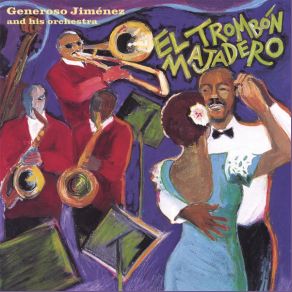El Trombon Majadero
Download links and information about El Trombon Majadero by Generoso Jimenez. This album was released in 1997 and it belongs to Salsa, Latin genres. It contains 12 tracks with total duration of 37:31 minutes.

|
|
|---|---|
| Artist: | Generoso Jimenez |
| Release date: | 1997 |
| Genre: | Salsa, Latin |
| Tracks: | 12 |
| Duration: | 37:31 |
| Buy it NOW at: | |
| Buy on iTunes $9.99 | |
| Buy on Amazon $8.99 | |
Tracks
[Edit]| No. | Title | Length |
|---|---|---|
| 1. | El Trombon Majadero | 3:19 |
| 2. | Llegaron del Otro Mundo | 2:59 |
| 3. | Descarga Solfeando | 2:41 |
| 4. | JAKY KY | 2:53 |
| 5. | La Rosa Roja | 3:22 |
| 6. | El Contrabajo Fantasma | 3:43 |
| 7. | Las Pilanderas | 2:53 |
| 8. | Ya No Me Quieres | 3:02 |
| 9. | Garabato | 2:57 |
| 10. | El Torrente | 3:00 |
| 11. | La Vieja Rosa | 3:32 |
| 12. | Una Dos y Tres | 3:10 |
Details
[Edit]This album is actually a re-release of a recording by trombonist Generoso "El Tojo" Jiménez and his orchestra in Havana's famous EGREM Studios in late 1965. By that time, Cuba had already weathered the revolution, the missile crisis, and sweeping reforms throughout the music industry, yet El Trombón Majadero draws heavily on the whimsical and glamorous style of the great orchestras of pre-Revolutionary Cuba. The album titles translates loosely to "the naughty trombone," so it's not surprising that the album focuses as much on lighthearted arrangements and compositions as it does on Jiménez's mastery of his instrument. Examples of this flamboyant approach are songs like the farcical "Llegaron del Otro Mundo" ("They Came From Another World") and "Descarga Solfeando" (Solfage Jam), where the only words are the "do, re, mi..." musical scale. But the music is at the heart of this album's quality, and a truly simplified Cuban big band album like this has been noticeably lacking in the more recent resurgence of Cuban music. Even though the album was remastered in the states before its release, it still retains a big, live sound that is very reminiscent of the breezy, thumping recordings of Prez Prado's or even Roberto Faz's orchestras in the first half of the century. ~Nathan Thornburgh, Rovi